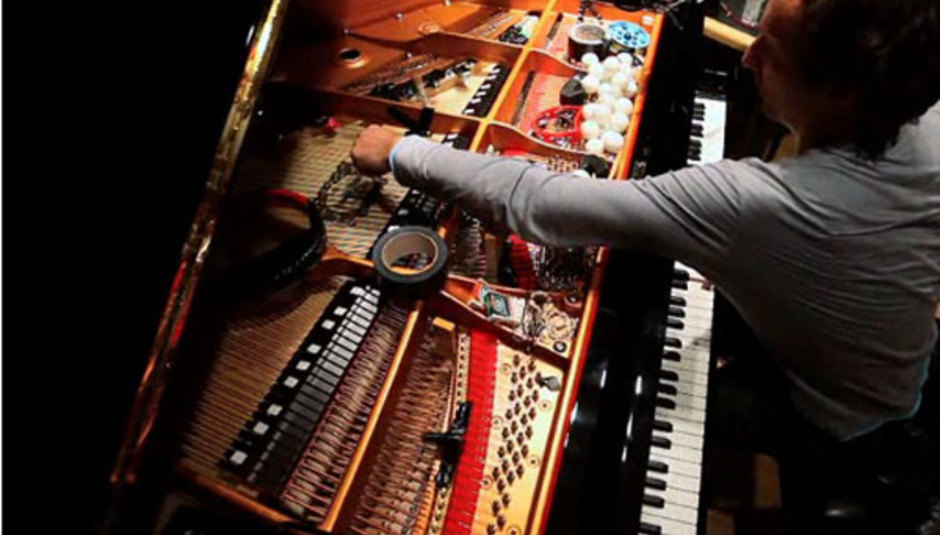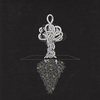On last year’s Salons Des Amateurs, German prepared piano experimentalist Volker Bertelmann – better known as Hauschka – took modern classical music by the scruff of the neck, dragging it out of fusty macchiato-sipping territory and onto the dancefloor. A searing snapshot of his current fascination with club culture, Salons' scattershot energy, agitated rhythms, Day-Glo melodies and gutter-punching melancholy – imagine John Cage, Thomas Brinkmann and Battles’ Ian Williams jostling over the DJ booth in a murky Berlin sweatbox at 3am and you're pretty much there – cemented his position as one of the most confounding and compelling classical talents operating today.
So, when offered the chance to catch up with the man himself over a crackly phone line as he gears up for a return to British soil at London’s Barbican Hall this coming Friday (18 May), DiS naturally obliged. What followed was a revealing insight into the processes and politics of his craft as well as a glimpse at his future plans – plus a few choice words for Peter Gabriel…
Your show at London’s Barbican is fast approaching. What’s in store?
Well, the first time I played the venue was wonderful, so I’m very much looking forward to it. As a venue, it’s one of my favourites in the world. To be playing there with two label mates who are also very good friends, well, this is a very good thing. I have fun in London every time. For me, it’s a city that has a very high speed, definitely in comparison to Dusseldorf. In comparison to other metropoles, it sticks out. It’s a city that feels like it needs money to feel confident. But that’s just an impression I have. Every time I go there I have a great time.
You’re sharing the stage with Johan Johannson and Dustin O’Halloran, fellow artists on Fat Cat’s 170301 imprint. Between 130701 and Erased Tapes, there seems to be a real sense of family and community to the modern classical genre at the moment.
Yeah, there is. There’s definitely overlapping. I know Nils Frahm, I know Peter Broderick, we invite each other to our concerts and of course there’s a high respect for each other. The family aspect, in terms of us supporting each other and hanging out with one another, is great but in general I like the idea of having my own musical shape, being on my own. I would rather leave the family than not feel myself within it. The danger in a musical family is it doesn’t matter who appears, they are either that guy or that guy but in the end it’s all the same – just part of a bigger whole. I’m really happy to be associated with Dustin and Johann though, they have a high sense of their own art. I like the way they challenge themselves.
Many of those artists began in rock music before turning to softer, more classical forms of music – Dustin was in an indie-rock band, whilst Erased Tapes’ Olafur Arnalds was in a hardcore band. Do you have a similar history or have you always been focused on classical and avant-garde music?
No, not at all. I had my first rock band at the age of 12. I was singing and writing the songs and we were covering the Stones, stuff like that, but also 80s German wave sort of songs. There were all these bands coming from West Berlin, which was divided at the time, making German rock music kind of a bold movement. Kraftwerk also blended into this time, they fitted nicely into the abstract kind of rock music around at the that time, so they were another influence. Then I was rapping in a hip-hop band called God’s Favourite Dog. That might surprise people, huh? I was at this time very much influenced by Stereo MCs. I liked their energy. Also bands like Public Enemy, Beastie Boys, stuff like that. At that time, I was into a lot of music from Seattle like Nirvana. So we were making music that was kind of crossing over between rap and rock. We had long hair and were stage diving. It was very… physical.
It’s interesting you mention Kraftwerk – there’s something quite mechanized about Salons that made me think of The Man Machine.
Well, you know, in Dusseldorf we have a lot of galleries and museums. There’s a lot of art – on a very high level. I don’t know about now, but there used to be a list of the best artists in Germany and the top 5 were all from Dusseldorf. As a city, we’re traditionally very creative and with that, very successful. So not only Kraftwerk but also Mouse On Mars kind of soaked up that abstractness and artistic emphasis. Maybe that’s blending into the music, making it a little different from the mainstream. Maybe the same thing is in my music, I don’t know. But yes, Kraftwerk are a group I very much respect.
The last time I saw you play, you were utilizing everything from vibrating sex toys to ping pong balls. Are these just every day items plucked from around the Bertelmann household or do you think when composing, hey, a dildo would make an interesting effect here?
The vibrators are just something I have lying around the household. I have ten and, you know, I don’t use them all in my act… [laughs] I actually found them, for example, in a slot machine at the airport. A lot of the things I use in my act are by accident like that. Sometimes I go into a shop to buy something and think, wow, I want to know how that sounds. In a way, there’s a randomness to it. But there’s also something very calculated, a plan to how I set my piano up – the things I choose to use. When I pack my suitcase I pack the things I need for a tour, but I often leave things at home on purpose, just because I’m tired of using them and like to challenge myself to work around it and invent new sounds. I see potential sounds wherever I go. For example, now I am sitting in a room with a sewing machine and I keep thinking of the needles, how the coils would sound. Sometimes I will work for weeks with one material, trying to find a new sound, new acoustic processes. Then there are periods where I just want to leave the piano as it is, because it sounds beautiful as it is.
It seems crazy that for a process as meticulous and intricate as prepared piano, you’re so fiercely prolific. Salons was your, what, eighth album is seven years?
Yeah, number eight. I think a lot of the time it’s actually the materials that take forever; the rest comes not easily, but with a certain flow to it, I’m quite lucky like that. For now, anyway. Maybe one day we’ll speak again and I’ll have ran out of ideas and you’ll say, What happened, man? When I write something, I’m inspired by all sorts of things. These days nearly every chord progression has been used: you play G, F, E, and then you think oh God, I know this song, I can’t use it anymore. But by altering the acoustic nature of the piano itself, it sounds interesting. You haven’t heard it before. It’s a new angle. That helps me keep productive, stay busy writing. I’ve actually just recorded 45, maybe 50 different pieces of music in Africa.
For an upcoming release?
Yes, hopefully in early 2013. The purpose of this project is to help people in other countries to connect with German culture and share some of theirs, like an exchange. So I spent time with musicians from Nairobi and Kenya. There was a choir of 70-year-old women then a couple of kids doing electronic music who just played South By Southwest. So yeah, it was a real discovery.
How’s it sounding?
Well, if you make a record in Brazil, you don’t want it to sound like Buena Vista Social Club, do you know what I mean? I didn’t want to exploit or pervert their native sounds and instruments. I wanted to do something exciting and real.
I have a feeling you’re about to mention Graceland.
You got me. That’s definitely not the idea. Paul Simon’s Graceland is not the worst example. I think a lot of people in Africa, they hear that music a lot and it somehow incorporates their tastes. It’s not Peter Gabriel, which is worse in taking African music as this exotic thing, recording it over the top of your thing to make you feel better, more inventive, when it’s actually exploitation.
There’s something I find weirdly hilarious about how you create these big, profound compositions out of these banal, everyday kind of items like Tic Tac boxes. Are you a funny guy?
You tell me! Sure, I’m funny. I like irony and melancholy, a mixture of those things. I’m sort of a responsible person – I have a family, I have things to take care of, you know? – but yeah, I like to laugh and part of that seeps through into my music, I suppose. Life is a gift and you have a certain amount of time to make the best of it. You might as well have fun, huh?
Your last record took a style of music that’s predominantly associated with very highbrow art circles – prepared piano experiments – and repositioned it within electronic dance, which exists, traditionally, on the opposite end of the cultural scale – it’s more a music ‘of the people’ so to speak. Was that a political statement?
To be quite honest, I wasn’t trying to reposition ideas about that kind of music and the people associated with it – it was more that I wanted to re-position myself. If you do something more than once, people make a monument of you. You start to feel like you have iron shoes, concrete on your feet. I am aware of what you mean, how what I did with Salons can seem political, but I wasn’t trying to make a statement about class or popularize art or anything when I was making the record. I was thinking much more about myself, rather than strategizing about reinventing an art form. I wanted to do electronic music but not without my instrument. Normally everyone would say, man, that’s impossible, you need a keyboard, but I wanted to do it.
Have you always been a fan of dance music?
I love dancing and I love the idea of dance music, even if I’m not a big fan of techno music. I love its structure, how it rises and falls. I love to dance to slow music, especially reggae. What I love with dance music is the culture, being in a club, drinking, dancing, having fun with friends. I love bass. Sometimes the most beautiful thing I can hear is stuff that is all low end and only the slightest, most delicate high end melodies: it can be pure chaos but so beautiful. But I don’t really follow it much, not on a mainstream level at least. I mean, just who is this Calvin Harris guy? I’m not familiar with him. I’m inspired by a lots of different types of music and there are different things I like about it and with dance music I love the culture. Even if I don’t really know who Calvin Harris is.
Hauschka plays London's Barbican Hall on 18 May with Johann Johannson and Dustin O'Halloran. Salons Des Amatuers is out now.






















